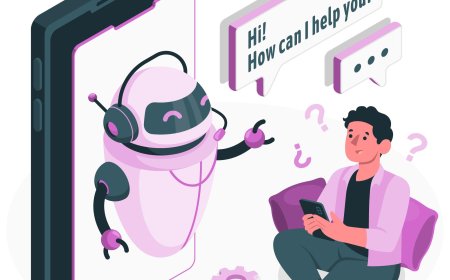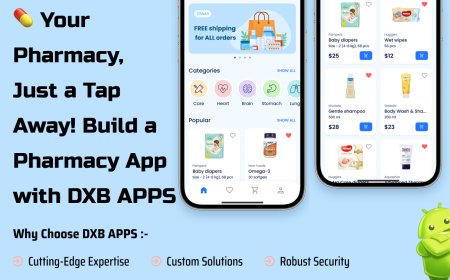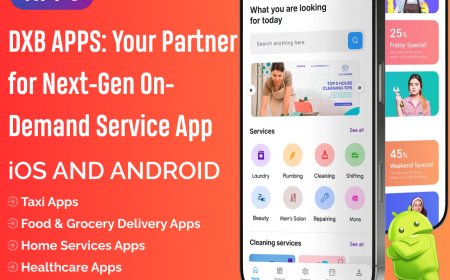How Can AI Enhance User Engagement in App Development?
This blog explores how AI enhances user engagement in app development and why adopting AI-powered strategies is essential to stay ahead of the curve.

In the ever-evolving digital landscape, businesses face a fierce battle to capture and retain user attention. Engagement has become the cornerstone of success for any application. Users are no longer satisfied with static experiences; they crave dynamic, personalized, and responsive interactions. Artificial Intelligence (AI) has emerged as the catalyst driving this transformation, redefining how developers design, build, and improve apps. This blog explores how AI enhances user engagement in app development and why adopting AI-powered strategies is essential to stay ahead of the curve.
Understanding User Engagement in Modern Apps
User engagement is more than just app downloads or sign-ups. It encompasses the entire spectrum of interactions users have with an app, including frequency of use, session duration, and retention. High engagement translates into stronger brand loyalty, higher conversion rates, and ultimately, increased revenue.
Traditionally, app engagement relied on static features and manual updates. However, these approaches struggle to keep up with users dynamic expectations. This gap has given rise to AI-driven capabilities that infuse applications with intelligence, adaptability, and context-awareness.
The Role of AI in Transforming User Experience
AI has revolutionized user engagement by enabling apps to learn from data, understand user behavior, and make predictions. Lets examine some of the most impactful ways AI redefines user experiences:
Personalized Recommendations
AI-powered recommendation engines analyze user preferences, past behaviors, and interactions to deliver relevant suggestions. For instance, music apps like Spotify and video platforms like Netflix use AI algorithms to recommend playlists and shows tailored to each users taste. This personalization keeps users coming back, dramatically increasing session length and satisfaction.
Intelligent Chatbots and Virtual Assistants
Chatbots and virtual assistants are no longer basic Q&A tools. AI has empowered them to conduct sophisticated conversations, resolve issues, and guide users effectively. With Natural Language Processing (NLP), AI-powered chatbots can interpret complex queries, detect sentiments, and provide instant solutions, reducing friction and enhancing engagement.
Predictive Analytics for Proactive Engagement
AIs predictive capabilities are instrumental in anticipating user needs and behaviors before they happen. By analyzing historical data, AI models can predict:
-
When a user is likely to churn
-
Which features they might explore next
-
What notifications will drive action
Armed with these insights, developers can trigger proactive messages, reminders, or incentives at the most opportune moments, sustaining engagement and reducing abandonment.
Dynamic User Interfaces and Experiences
Static interfaces can quickly lose users interest. AI makes it possible to create dynamic interfaces that adapt to context, behavior, and preferences. For example:
-
E-commerce apps can rearrange products based on browsing habits.
-
Fitness apps can adjust workout recommendations in real-time.
-
News apps can prioritize content relevant to users reading patterns.
This level of customization makes users feel understood and valued.
Hyper-Personalized Content Delivery
Content is king, but relevance is what crowns it. AI analyzes multiple data sourcesfrom location to in-app activityto deliver content that resonates with users in their unique context. For instance:
-
A travel app can recommend local attractions when a user lands in a new city.
-
A recipe app can surface meal ideas based on past cooking preferences and dietary restrictions.
By ensuring every interaction feels curated, AI keeps users engaged and satisfied.
Enhancing Onboarding Experiences
The first few minutes in an app often determine whether a user will return. AI optimizes onboarding by:
-
Identifying friction points where users drop off
-
Personalizing onboarding flows based on user profiles
-
Automating tutorials that adapt to user progress
This intelligent onboarding reduces learning curves and accelerates time-to-value, encouraging repeat visits.
Real-Time Feedback and Sentiment Analysis
AIs ability to process vast amounts of data extends to sentiment analysis. Apps can leverage AI to:
-
Analyze reviews and ratings to detect patterns
-
Monitor in-app chat for user frustration
-
Collect real-time feedback through conversational surveys
This information empowers developers to respond quickly, resolve issues, and demonstrate a commitment to continuous improvement.
Contextual Push Notifications
Notifications can either drive engagement or push users away. AI ensures that push notifications are:
-
Sent at optimal times based on user activity
-
Personalized to each users interests
-
Relevant to current context and preferences
This targeted approach increases open rates and drives deeper engagement.
AI and Gamification
Gamification techniques like badges, leaderboards, and challenges keep users engaged. AI amplifies gamification by personalizing experiences:
-
Adjusting difficulty levels based on skill and progress
-
Recommending challenges tailored to user interests
-
Recognizing achievements dynamically
The result is a more rewarding and motivating user journey.
Continuous Learning and Optimization
One of AIs most compelling advantages is its capacity for continuous learning. Unlike traditional static algorithms, AI models evolve with every interaction:
-
A/B tests can run automatically, refining strategies in real time.
-
User preferences inform dynamic content adjustments.
-
Behavioral data shapes future recommendations.
This constant optimization ensures the app remains fresh, relevant, and engaging over time.
AI in Voice-Enabled Engagement
Voice interfaces are becoming a standard feature in many apps. AI-powered voice recognition enables hands-free, conversational experiences that are more natural and accessible:
-
Virtual assistants can help users schedule appointments or find information.
-
Voice commands can streamline navigation within apps.
-
Conversational interfaces can provide companionship and support.
These features break barriers to engagement and open new avenues for interaction.
Data Security and Trust
While AI delivers tremendous benefits, it also raises important questions about data privacy. Users must trust that their information is secure. Responsible AI implementation includes:
-
Transparent data usage policies
-
Compliance with regulations such as GDPR and CCPA
-
Secure storage and encryption of personal data
By prioritizing security and ethics, developers can build trust and encourage long-term engagement.
Collaboration with Experts
Implementing AI-driven engagement strategies requires expertise. Partnering with an AIsoftware development company in USA can help you leverage advanced AI technologies while ensuring your app meets the highest standards of usability and compliance. Collaborating with specialists enables businesses to transform their vision into intelligent, engaging digital experiences.
Future Trends: Where AI-Driven Engagement is Headed
AIs role in user engagement is just beginning. Here are a few trends to watch:
Emotion Recognition
Future apps will harness AI to detect user emotions through voice, facial expressions, and behavior, enabling more empathetic and human-centered experiences.
Augmented Reality (AR) Integration
AI-powered AR features will make interactions more immersive, combining real-world environments with digital overlays.
Advanced Behavioral Predictive Models
AI models will become even more sophisticated, predicting not just actions but underlying motivations, enabling truly proactive engagement.
Conclusion
AI has fundamentally redefined how developers approach user engagement. From personalization and predictive analytics to dynamic interfaces and conversational experiences, AI empowers apps to exceed user expectations. As competition intensifies, embracing AI is no longer optionalits a strategic imperative.
By thoughtfully implementing AI capabilities, businesses can create apps that feel intuitive, responsive, and indispensable to their users. Whether youre enhancing onboarding, refining notifications, or building advanced recommendation engines, AI offers the tools to build lasting engagement and loyalty.
With the right vision and technology partners, any organization can unlock the full potential of AI in app developmentturning casual users into devoted advocates.












































